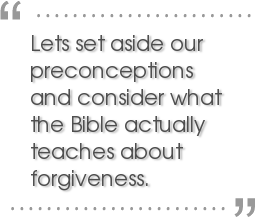"[I]f you had asked me at another time I would have told you that I had forgiven this person"
Body
“When ‘that person’ who hurts you comes back to mind (and they will.) The right thing to do (not the easy thing to do) is to choose in that moment to forgive. No matter how many times you have done it in the past, you need to learn how to do it over and over again.” CPost
Discussion
The Tragedy of Self Deception: Relationships
 Posted by permission of Think on These Things and Voice. (Read Part 1.)
Posted by permission of Think on These Things and Voice. (Read Part 1.)
The only means we have to free ourselves from habitual self-deception is the mirror of the Word of God.
Anger
Scripture never condemns anger per se. As a matter of fact we are given examples of appropriate, godly anger in the life of Jesus and a number of His followers, and we are actually commanded to “be angry” at times (Eph 4:26a). Obviously if God is angry at sin it cannot be wrong for believers to be angry at the same sins. Righteous anger reacts against actual sin, not against inconvenience or violation of personal preference. Righteous anger, instead, is concerned about the Lord and His glory. It is focused on what offends God and injures others, not about what harms the angry person. Righteous anger is self-controlled and concerned for the good of others.
Discussion
Should Forgiveness be "Unconditional"?
 The forgiveness controversy
The forgiveness controversy
Back in 1999, I preached a series on the subject of forgiveness. Many folks in our congregation had never heard the approach I took. A number commented that they heard Christian leaders on the radio or in magazines take the opposite position during the weekdays between my sermons.
The world and much of evangelicalism believe that we should forgive unconditionally. Secular psychologists and popular preachers have formed an alliance that intimidates many of us from even considering the alternatives. Yet many Bible teachers believe that forgiveness is conditioned upon repentance. I am in the latter group.
Bible-believing Christians agree that we are to forgive others as God forgives us. If you believe God forgives unconditionally, this would logically lead you to Universalism, the belief that everyone is saved; no one is under the wrath of God because God’s wrath is not directed toward those who are forgiven. If God forgives unconditionally, then none are unforgiven. Most evangelicals recognize that multitudes are lost, yet many say that God forgives unconditionally. Do you see the contradiction here?


Discussion